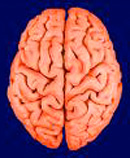|

The Transcendental Meditation technique is unique in its ability to make the brain healthier and able to function together as a whole.
|
|
by Global Good News staff writer
7 December 2009
In an interview at Maharishi University of Management in Fairfield, Iowa, USA and posted on the website tm.org, Dr Fred Travis explained the benefits of integrated functioning of the brain and how it is brought about by the practice of Transcendental Meditation.
You talk about how the Transcendental Meditation technique promotes ‘integrated brain functioning.’ What does that mean—and why is it important?
Dr. Travis: ‘There are different areas in the brain for seeing, hearing, thinking, feeling—for anger and happiness—for acting, deciding, planning. When your brain is healthy, all these areas work together—they are “integrated.” Integration is important because your world, your environment, is constantly changing. You need a healthy, integrated brain that can evaluate where you are, decide where you want to be, and then decide on the steps to get there.’
Is the whole brain involved in such decisions?
Dr. Travis: ‘The part of the brain that is most critical for evaluating all the information is called the frontal lobes or association cortex. This part of the brain doesn’t get any direct information from outside—it puts together what the senses have brought in through hearing, seeing, touch, etc. The frontal lobes are like a conductor who takes the talent from different sections of the orchestra and puts them all together into a whole piece of music.’
There is considerable talk about stress and brain functioning. What happens to the brain with a stressful experience?
Dr. Travis: ‘Stressful experiences keep the frontal lobes from developing. Among stressful experiences I include alcohol and drug abuse, growing up in a broken home, living in fear of violence and crime, even a bad diet. And when a person’s frontal lobes don’t develop, he lives a primitive life. He can’t—and doesn’t—plan ahead. His world is simplistic, and he can only deal with what’s happening to him right now. That’s where the rigid thinking comes in: “You’re either with me or against me,” or “Me and my gang are good, and everyone else is up against us.”
‘Take the example of alcohol. Drinking destroys brain cells overall and cuts the connections to the frontal lobes. Connections between the frontal lobes and other brain areas start to develop when you’re 12 or 13 and continue into your late 20s and early 30s. So if you’re drinking in school, you’re doing the worst possible thing you can do for your brain—and your life.’
Can you see this destruction in the brain?
Dr. Travis: ‘Absolutely. The frontal lobes are not activated in the brains of people who are violent, who are impulsive, who cannot control their actions. Again, these people have a primitive view of the world. It’s just—“I see the chocolate bar; I take the chocolate bar. I see the car; I take the car.”’
Can the brain change?
Dr. Travis: ‘Luckily, yes. The brain is always changing through a lifetime of experiences. No matter what experiences may have happened in the past that have shut down these brain circuits, the brain can be changed if you choose specific new experiences.’
Such as…?
Dr. Travis: ‘Such as the Transcendental Meditation program. Research shows that the Transcendental Meditation technique provides a highly specific new experience of the silent basis of the active mind. This is a state of inner wakefulness without particular qualities or attributes. And according to the research, this experience creates a more integrated functioning in the frontal areas of the brain. In fact, the Transcendental Meditation technique is unique in its ability to exercise this critical part of the brain—to make the brain healthier and able to function together as a whole.’
Is there evidence?
Dr. Travis: ‘Within two or three months practice of the Transcendental Meditation technique, we begin to see high levels of integration of frontal brain connectivity. And interestingly, that integration does not disappear after the Transcendental Meditation technique practice—increasingly and over time, that orderly brain functioning is brought into daily activity.
‘Research shows that in those who have been meditating for many years—an average of 24 years—inner wakefulness and brain integration are maintained all the time. And, in truth, this should be the purpose of education. Education should not just be about learning multiplication or periodic tables. It should culture integrated brain functioning as well so that you make better decisions, evaluate situations more accurately, and enjoy more of life throughout your life.’
You say it is important to start this process during your student years. Why?
Dr. Travis: ‘For the first 20 years of life, the connections between the brain cells are increasing and decreasing, the output is maturing, and the speed of processing is getting faster. This is the ideal time to build the circuits in the brain that will last a lifetime.
‘Then, when a student finishes his education at age 25 with a master’s or a Ph.D., he will be not only a master in one specific area of life, but a master of life itself. Right thinking will arise from the deepest, most fundamental level of life. Then spontaneously, actions will be right—in tune with the environment and the people around him.
‘This is the state of enlightenment—and this is the vision of possibilities open to any student, no matter his age, religion, or nationality, when the Transcendental Meditation program is part of the school’s curriculum.’
© Copyright 2009 Global Good News®
|


